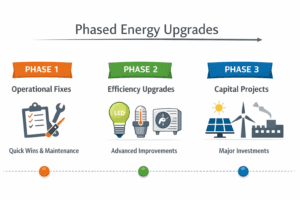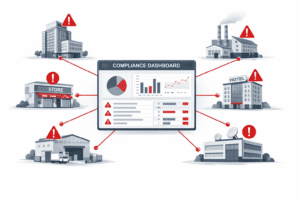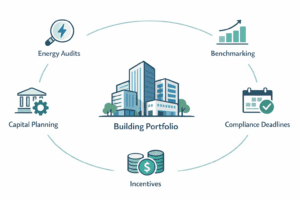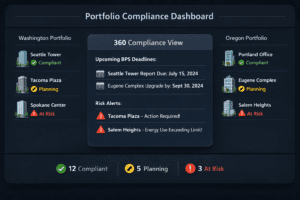Introduction
In today’s ever-evolving world, sustainability and environmental responsibility have emerged as major problems. Organizations in the construction sector are becoming more aware of the necessity of coordinating their operations with energy efficiency requirements and environmental legislation. The EBEWE Compliance framework is one of these important pieces of legislation. This essay focuses on its definition, advantages, and implementation tactics as it examines the vital part that EBEWE Compliance plays in the leadership of the building sector.
Understanding EBEWE Compliance
EBEWE Compliance, short for Energy, Building, and Water Efficiency compliance, encompasses a comprehensive framework that sets out specific criteria and standards for evaluating a building’s performance, reporting and disclosure, and methods utilized to ensure compliance. The primary objective of EBEWE Compliance is to enhance energy efficiency in buildings and promote sustainable growth within the construction industry.
To achieve EBEWE Compliance, buildings must meet and adhere to certain energy efficiency standards. These standards encompass a range of factors, including insulation, HVAC (Heating, Ventilation, and Air Conditioning) systems, lighting, water usage, and renewable energy integration. By implementing energy-efficient measures, buildings can minimize their environmental impact and contribute to the reduction of greenhouse gas emissions.
The evaluation of a building’s performance is a crucial aspect of EBEWE Compliance. Building performance assessments involve comprehensive examinations of energy usage, water consumption, indoor air quality, and overall environmental impact. These assessments help identify areas for improvement and guide the implementation of energy-saving measures and sustainable practices.
The Benefits of EBEWE Compliance
EBEWE Compliance offers many benefits to organizations and society.
1. Environmental Benefits: EBEWE Compliance plays a vital role in reducing carbon emissions, conserving natural resources, and mitigating the environmental impact of buildings. By adhering to energy efficiency standards and implementing sustainable practices, organizations contribute to the overall reduction of greenhouse gas emissions and promote a greener future.
2. Economic Benefits: EBEWE Compliance can lead to substantial cost savings for building owners and occupants. Energy-efficient buildings consume less energy, resulting in lower utility bills. Additionally, implementing energy-saving measures and technologies often increases the value of properties and improves marketability.
3. Social Benefits: EBEWE Compliance positively impacts the well-being of occupants by promoting healthier indoor environments. Energy-efficient buildings prioritize factors such as improved ventilation, temperature control, and lighting quality, leading to enhanced comfort, productivity, and occupant satisfaction.
EBEWE Compliance and Building Industry Leadership

Organizations that prioritize EBEWE Compliance gain several advantages, positioning themselves as leaders within the building industry.
Enhanced Reputation and Branding: By embracing EBEWE Compliance, companies demonstrate their commitment to sustainability and environmental stewardship. This proactive stance helps build a positive reputation and strengthens their brand image as socially responsible organizations.
Competitive Advantage in the Market: EBEWE Compliance provides a competitive edge by differentiating organizations from their peers. Building owners and tenants increasingly seek sustainable buildings that meet high energy efficiency standards and being EBEWE compliant positions companies as preferred partners.
Attraction of Investors and Clients: EBEWE Compliance displays an organization’s forward-thinking approach and long-term vision. This attracts environmentally conscious investors and clients who value sustainability, leading to increased opportunities for partnerships, collaborations, and investments.
Alignment with Sustainability Goals and Trends: EBEWE Compliance aligns with global sustainability goals and emerging market trends. As governments and regulatory bodies emphasize energy efficiency and environmental performance, organizations that proactively adopt EBEWE Compliance standards position themselves at the forefront of the industry.
Compliance as a Catalyst for Innovation: EBEWE Compliance drives innovation within the building industry. Organizations committed to compliance are more likely to invest in research and development to find new and efficient technologies, materials, and building practices. This innovation fosters creativity, drives industry advancements, and positions organizations as industry leaders.
Overcoming Challenges in EBEWE Compliance
Implementing EBEWE Compliance can pose challenges that need to be addressed for successful adoption.
Financial Barriers and Cost Considerations: Upfront costs associated with implementing energy-efficient technologies and complying with EBEWE standards can be a barrier for some organizations. Governments and financial institutions can play a crucial role by offering incentives, grants, and favorable financing options to promote compliance.
Lack of Awareness and Knowledge: Many organizations may be unaware of the benefits and requirements of EBEWE Compliance. Raising awareness and providing education and training programs can help bridge this knowledge gap and encourage widespread adoption.
Regulatory and Policy Issues: Inconsistencies in regulations, complex compliance procedures, and differing standards across regions can create confusion and hinder compliance efforts. Governments and regulatory bodies should strive to establish harmonized and streamlined regulations to facilitate compliance.
Limited Availability of Skilled Workforce: The successful implementation of EBEWE Compliance requires a skilled workforce trained in energy-efficient construction and building management practices. Investing in workforce development programs and collaborations between educational institutions and industry stakeholders can help address this challenge.
Addressing Challenges through Collaborative Efforts
To overcome these challenges, collaboration among stakeholders is crucial. Governments, industry associations, educational institutions, and organizations must work together to create a supportive ecosystem that fosters EBEWE Compliance. By sharing best practices, providing resources, and establishing platforms for knowledge exchange, stakeholders can collectively drive compliance and facilitate industry leadership.
Strategies for Building Industry Leaders to Embrace EBEWE Compliance

Building industry leaders can adopt various strategies to embrace EBEWE Compliance and establish themselves as frontrunners in sustainable construction.
Integration of EBEWE Compliance into Corporate Culture: Building industry leaders should embed EBEWE Compliance principles into their organizational culture, making sustainability and energy efficiency an integral part of their vision, mission, and values.
Education and Training Programs: Organizations can invest in employee training programs to educate their workforce about energy-efficient practices, compliance requirements, and the benefits of EBEWE Compliance. This enables employees to contribute actively to compliance efforts.
Collaboration with Industry Associations and Government Bodies: Building industry leaders can actively engage with industry associations and government bodies to shape regulations, advocate for favorable policies, and contribute to the development of industry-wide compliance standards.
Incentives and Rewards for EBEWE Compliance: Recognizing and rewarding organizations that demonstrate exemplary EBEWE Compliance efforts can incentivize others to follow suit. Industry-wide recognition programs, certifications, and awards can motivate companies to prioritize compliance and strive for continuous improvement.
Continuous Improvement and Innovation: Building industry leaders should continually explore new technologies, materials, and practices that enhance energy efficiency and contribute to EBEWE Compliance. By fostering a culture of innovation, organizations can maintain their leadership position and drive industry-wide advancements.
Conclusion
EBEWE Compliance plays a critical role in building industry leadership by promoting energy efficiency, environmental sustainability, and innovation. Organizations that embrace EBEWE Compliance gain a competitive advantage, enhance their reputation, attract investors and clients, and align with global sustainability goals. Despite the challenges, collaborative efforts, education, and proactive strategies can help organizations overcome barriers and pave the way for a sustainable future. By prioritizing EBEWE Compliance, building industry leaders can demonstrate their commitment to a greener, more efficient, and socially responsible built environment.
If you are looking for an expert Commercial Energy Audit and Benchmark Compliance consultancy, look no further! Contact us at Vertpro.com! We are an award-winning Energy Benchmarking and Audit Consultancy, recognized on Inc. 5000, providing innovative SaaS technology-based solutions for Building Owners & Property Managers to Simplify Energy Compliance with all 50+ Energy Benchmarking & Energy Efficiency Laws Nationwide. From Energy Benchmarking to Energy Audits/RCx Plus and Construction Marketplace, VertPro® has you covered.















